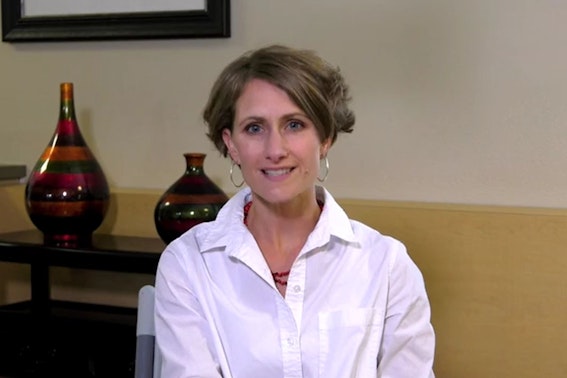Staying positive on dialysis

Managing emotions and getting help
Living with any chronic condition, such as CKD, has many challenges, some physical and some emotional. It’s very common to feel sad, scared, frustrated and angry as you manage your health along with all the other aspects of life. At times, these emotions can feel overwhelming.
Here are a few things you can do to stay positive:
- Follow your care team’s advice. Get your full treatment time, take your prescribed medications and learn all the ways to live the healthiest and longest life possible.
- Focus on the things you have to live for such as the love of a life partner, watching young people in your life grow up, or the pleasure that comes from nature and art.
- Find ways to cope with stress to help you through the rough days, such as music, reading, time with friends.
- Be kind to yourself. Bad days happen, so don’t be hard on yourself. Do your best and allow for a few mistakes.
- Spend time with people or things that make you laugh. Laughter is one of the best ways to raise our spirits.
Most importantly, share how you’re feeling with others:
- Many people on dialysis find discussing these emotions with a trained professional makes it easier to get through the tough times. Ask your kidney doctor or social worker for suggestions.
- Others also find it helpful to speak with people going through a similar experience. You might meet people with similar interests at your dialysis center, or choose to join an in-person or online support group.
When something isn’t working, tell your kidney doctor, social worker, or care team. They’re here to help you whenever they can. You’re not alone.
Dialysis at home means significantly more freedom – for your schedule, for your meal plan, to travel and so much more!

You and Your Social Worker
Lina, a Satellite social worker, outlines all the ways a dialysis social worker can help make life a little easier – how to get answers on financial matters, help with reliable transportation, dialysis options that might offer more energy and flexibility, and much more.

Something to live for
Mrs. Keith shares her experience starting dialysis and the emotions she felt. With help from her social worker and a desire to watch her granddaughter grow, she’s now managing the details related to treatment and feeling more hopeful.

Find ways to laugh
Laughter is one of the fastest, easiest ways to boost your mood. Satellite developed a laughter program for dialysis centers. This video gives you more information on the program plus walks you through the top ten laughter exercises. Get ready to get a little silly and laugh.
Dialysis and how you look at your body
Most of us care about the way we look. How we feel about our looks is called ‘body image.’ Body image affects our self-esteem and could include how much value we think we have.
What physical changes can I expect as I begin dialysis treatment?
For hemodialysis, with a fistula and a graft, scar tissue and marks are visible from the surgery. Changes occur over time as the access matures.
- With a fistula, the vein wall thickens and increases in diameter. It may look like you have “bulging veins” at the access site.
- With the graft, the artificial tube is noticeable under the skin and can be seen when you wear short-sleeve shirts.
- If you have a temporary catheter inserted in the neck or chest, there’s a small scar from the incision.
For peritoneal dialysis (PD), the PD catheter (tube) is placed surgically in your peritoneum (lower abdomen). Half of the catheter extends from your abdomen. Some people gain a few pounds because of the sugar in the dialysis fluid. And, because the dialysis fluid dwells inside, your tummy area may look fuller than before you started treatment.
I’m worried that these changes will make me ‘ugly’. What happens if people stare?
This is a valid concern that many people have as they begin treatment. As they adapt, many people find that they get less stares than they expected.
In addition, after a while, many people on dialysis choose to look at their dialysis access as a badge of honor. They tell themselves, ‘this is a unique part of my life and my will to live with chronic kidney disease. I think people will notice my access. That’s okay. I’m unique. I’m alive. I can use my arm to educate others about this quiet disease.”
Are there other ways to help adjust to these changes?
- Your doctor is one person who can address your concerns about body changes and dialysis. Don’t be embarrassed to mention how you feel about your appearance. Your self-esteem is a major part of your overall health and your ability to live with chronic kidney disease.
- Your dialysis center social worker can help you with your concerns and even suggest a support group in your area.
- Consider speaking to others with the same experience through these two websites:

Peer support/mentoring
Hearing someone’s story and perspective can help you adjust to what you may be going through. Peer mentoring programs connect you to someone who’s been through a similar situation. Ask your care team if they have a local peer mentoring program, or try the NKF PEERs program.

Online communities
Just one of a number of online communities, NKF communities offer a safe and supportive place where patients and caregivers can share experiences, ask questions and get answers related to kidney health, kidney disease, transplantation and living organ donation. Participation is free and anonymous.

Get answers
If you have a question about CKD, dialysis, or how to live a healthy lifestyle, ask someone on your kidney care team. They’re ready to listen anytime.
In addition, NKF CARES is a free information helpline available Monday through Friday from 9am to 5pm Eastern Time: 1.855.653.2273 that’s ready to answer questions and offer suggestions.
Kidney Talk Podcast
Hear how others who have kidney disease manage and have learned to thrive in spite of the emotions that come with kidney disease. Learn how to deal with negative feelings and anxiety, and turn them into a hopeful outlook toward the future.
